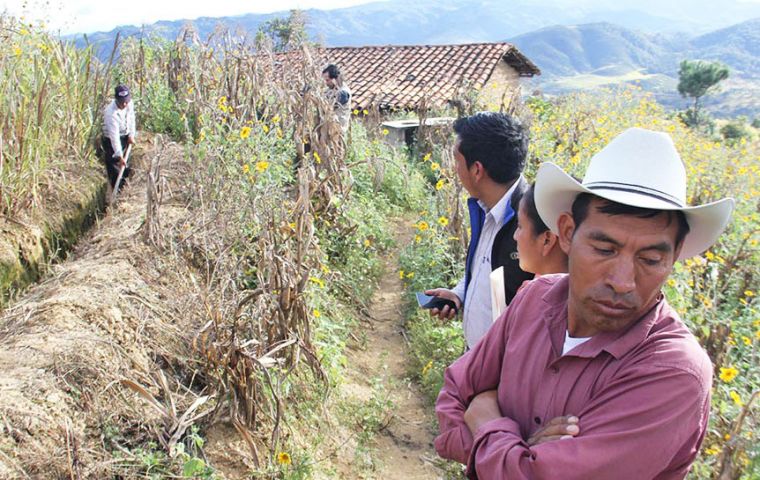MercoPress. South Atlantic News Agency
Hunger, one of the main causes of migration to U.S. from the “Dry Corridor”
 The report analyzes links between food insecurity and migration in the Central American nations, particularly of the region known as “The Dry Corridor” (Pic FAO)
The report analyzes links between food insecurity and migration in the Central American nations, particularly of the region known as “The Dry Corridor” (Pic FAO)  OAS Assistant Secretary General Nestor Mendez said, “without human rights there is no social inclusion nor democracy nor societies in peace”.
OAS Assistant Secretary General Nestor Mendez said, “without human rights there is no social inclusion nor democracy nor societies in peace”.  In fiscal 2016, US Migration and Customs Enforcement detained more than 400,000 undocumented people, of whom nearly 60,000 were under the age of 16
In fiscal 2016, US Migration and Customs Enforcement detained more than 400,000 undocumented people, of whom nearly 60,000 were under the age of 16 A new report presented at the headquarters of the Organization of American States (OAS) finds that migration from El Salvador, Guatemala and Honduras to the United States is motivated in large part by poverty and hunger, aggravated by drought conditions associated with the El Niño phenomenon that began in 2014.
The report “Food security and emigration: why people flee and the impact on family members left behind in El Salvador, Guatemala and Honduras” analyzes the connection between food insecurity and migration in the these Central American nations, particularly in one of the most vulnerable areas of the region known as “The Dry Corridor”, which crosses all three countries.
At the opening of the event, OAS Assistant Secretary General Nestor Mendez said, “without human rights there is no social inclusion nor democracy nor societies in peace. When millions of our fellow citizens are hungry, when the benefits of development do not reach everyone, when wealth is only shared by some, we cannot ensure a democratic path for our region.”
According to the Regional Director for Latin America and the Caribbean of the World Food Program (WPF), Miguel Barreto, “The study provides an important insight into why people flee and the impact on the family members staying behind.”
“It is perhaps this second aspect which makes this study stand out from much of the analysis conducted on migration from El Salvador, Guatemala, and Honduras to date,” added Barreto.
For his part, the Foreign Minister of El Salvador, Hugo Martinez, agreed with the study that there is a “clear link between food security and migration.” “The impact of climate change is very drastic in the Dry Corridor and particularly in El Salvador. In 2015 alone we lost 470,000 tons of maize, and about 6,000 tons of beans.”
Guatemala's Minister of Food Security and Nutrition, German Gonzalez, also indicated that his country is suffering from the effects of climate change, and mentioned the damages caused by the phenomenon of El Niño in the last five years. “The rainfall deficit has caused damages and losses in the basic grain crops of the Dry Corridor farmers, and this situation affected the capacity of response and the nutritional security in the short and medium term.”
The report shows the need to invest in long-term programs to discourage people in the Dry Corridor from migrating, reduce the dangers faced by migrants on their trip to the north, and the impact on families left behind after the departure of the strongest members of the family nucleus in search of better opportunities.
The report states that last year, 47% of households in the Dry Corridor of El Salvador, Guatemala and Honduras had some of their members migrated because of food insecurity.
Some figures show the extent of the challenge: in fiscal 2016, US Migration and Customs Enforcement (CBP) detained more than 400,000 undocumented people on the southern border, of whom nearly 60,000 were under the age of 16, most of them from El Salvador, Guatemala, and Honduras. A 58% of the households interviewed for the study in the Dry Corridor spend more than two-thirds of their income on food, showing a high level of economic vulnerability. The 42% of households interviewed in Guatemala showed worrying levels of insufficient food consumption; Violence plays an important role as a trigger for migration in El Salvador, but it is a less important cause; 79% of migrants are men between the ages of 20 and 29, and half of the deportees worked in agriculture before leaving.




Top Comments
Disclaimer & comment rulesCommenting for this story is now closed.
If you have a Facebook account, become a fan and comment on our Facebook Page!